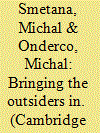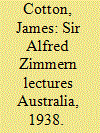|
|
|
Sort Order |
|
|
|
Items / Page
|
|
|
|
|
|
|
| Srl | Item |
| 1 |
ID:
165589


|
|
|
|
|
| Summary/Abstract |
Searching for an alternative founding myth for international relations (IR) entails going back long before the 1648 Westphalian milestone. Drawing from a world historical approach, this article makes the case for investigating the origins of the subject matter of IR in the pre-state era: its founding moment may be traced back to a first encounter between two distinct bands of nomadic Homo sapiens hunter-gatherers in the Palaeolithic period. As the outcome of this interaction was not predetermined, four scenarios are considered: absence of relations by retreat and isolation; conflict triggered by self-preservation (birth of war); cooperation, barter or other types of exchange; and merging together. Following the initial engagement, intergroup relations became much more intertwined. Once the stranger was no longer unknown, the original distinction between Us and Them began to fade away. The ensuing relationship shaped their co-constructed social reality, in a long process of extending trust beyond the family circle.
|
|
|
|
|
|
|
|
|
|
|
|
|
|
|
|
| 2 |
ID:
165591


|
|
|
|
|
| Summary/Abstract |
In this article, we draw on insights from the interactionist perspective in sociology and international relations (IR) norm contestation literature to explore the relationship between deviance and normative change in international politics. In IR, this is still largely unexplored territory: we already know a great deal about how norms change, yet we know much less about the actual role norm violations play in this process. In order to address this gap, we conceptualize three types of normative contestation and affirmation that take place in connection with deviance (re)construction: (1) applicatory contestation and affirmation, reconstructing the meanings of international norms; (2) justificatory contestation and affirmation, challenging and reaffirming the legitimacy of international norms; and (3) hierarchical contestation and affirmation, contesting and reaffirming the relative value and importance of international norms. We discuss how, as a consequence of these dynamics, deviance-making produces both stability and change in the normative structure of world politics.
|
|
|
|
|
|
|
|
|
|
|
|
|
|
|
|
| 3 |
ID:
165590


|
|
|
|
|
| Summary/Abstract |
Professor Sir Alfred Zimmern, a highly prominent British commentator on international politics, was a notable visitor to Australia in 1938. Due to the critiques of EH Carr, Martin Wight and Hedley Bull, Zimmern became associated with the ‘utopian’ school of analysis of the inter-war period. In a stay lasting five weeks which coincided with the Munich crisis, his (now neglected) lectures and broadcasts were widely reported. Zimmern did not fully endorse the Munich agreement, which had been negotiated by British Prime Minister Neville Chamberlain and was supported by Australian Prime Minister Joseph Lyons. He was privately critical of Australian policy-makers. Despite Bull’s claim that Zimmern was a believer in progress and thus bound to discern the growth of order in international affairs, Zimmern’s analysis of the Munich agreement emphasized the return of power politics and the dangers of war. Further examination of his 1930s writings shows that such possibilities were not inconsistent with his broader analysis of international relations.
|
|
|
|
|
|
|
|
|
|
|
|
|
|
|
|
| 4 |
ID:
165592


|
|
|
|
|
| Summary/Abstract |
The cross-border impacts of whistleblowing recently have become far more visible and consequential, as evident with the ‘Paradise’ and ‘Panama Papers’ leaks, which exposed tax and other financial wrongdoings of prominent personalities around the world, leading to scandals, resignations and prosecutions. Despite its new prominence, whistleblowing often continues to be seen as a series of ad hoc chance acts. We argue instead that whistleblowing is an increasingly institutionalized regulatory tool that is enabled by an emergent ‘whistleblowing system’, with similarities to other new forms of informal global governance. Whistleblowing can be controversial, and we develop a framework for assessing whether any particular whistleblowing event and the system that enables it are in the public interest. We then apply this analysis to the case of global tax evasion. We conclude that a whistleblowing system can make important contributions to difficult cross-border regulatory challenges such as tax evasion, especially where other governance systems fail.
|
|
|
|
|
|
|
|
|
|
|
|
|
|
|
|
|
|
|
|
|